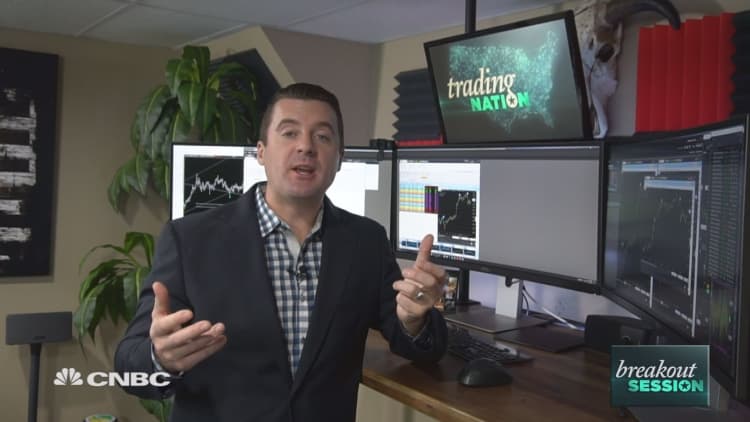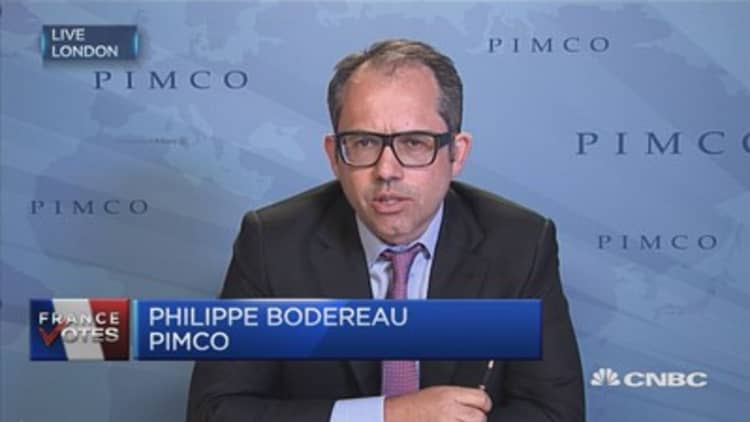
Banking is the one industry above all others that should cruise higher during a Trump administration, but the road likely won't be smooth.
In business terms, no one cheered louder than financial institutions after President Donald Trump's stunning November election victory. The sector surged more than 25 percent on hopes that higher interest rates, stronger
Nearly 100 days into the Trump administration, the picture has become muddied.
The muscular performance after the election didn't last, and the sector is about flat now for the year. First-quarter earnings saw strong profits for banks, but weak lending. The initial steps toward deregulation finally came about last week, but there's much to be done.
In all, banks face as uncertain a future as pretty much anything else in the Trump economy.
"Since the inaugural, many of the public policy issues that had been factored in have dissipated from the stocks. The rally has met reality," said Fred Cannon, director of research and chief equity strategist at financial services firm Keefe, Bruyette & Woods. "Now bank stocks have gone from very exciting, where everything's going to get better, to a show-me kind of a thing."
If the current momentum is any indicator, banks could be ready to show a lot.
Big earnings growth, but loans lag
Financials — a sector that includes insurers, investment funds and real estate, in addition to banks — have reported earnings growth of 16.4 percent, with revenue growing more than 9 percent. Bank stocks specifically, however, actually fell about 1.5 percent during the first three months.
That postelection performance through the end of 2016 was going to be hard to keep up. The initial surge came
The real proof now will come through the year, as fundamentals and the outlook for policy and regulations come more clearly into focus. In addition to Trump's push for deregulation, the Federal Reserve already has hiked its benchmark interest rate once since Inauguration Day and is likely to approve one or two more increases before the year is out.
"A lot of (the initial rally) was that we don't have (Massachusetts Sen.) Elizabeth Warren whispering into the ear of the president and the secretary of the Treasury," said Richard Farley, head of law firm Kramer Levin's leveraged finance group. "There was an embedded discount in the market because of the expectation of a Democratic presidency and Senate and an administration that wanted to stay in good stead with the extreme left of the Democratic Party."
Trump's rhetoric has alternated between being tough on Wall Street risk-taking on the one
"Consumers,
While consumer and mortgage lending has grown since the recession, commercial and industrial lending — a reliable barometer of economic growth — has stalled of late and raised concerns about the economy's potency.
"The most troubling thing is the weaker-than-expected loan growth," Cannon said. "If that persists into the second half of the year, the whole view that we're really going to get better growth plus higher rates plus blue-sky issues will really dissipate."
In the meantime, Trump has taken some concrete steps toward loosening the shackles on banks and taking some of the teeth out of the post-crisis Dodd-Frank reforms.
Separate directives issued Friday call for a re-evaluation into what makes a bank a "systemically important financial institution," or
"In sum, these executive orders signal a willingness by the president to take some action on Dodd-Frank," analyst Dick Bove, vice president of equity research at Rafferty Capital Markets, said in a note to clients. "In real terms, however, even if they result in some rule changes, the impact on the industry will be negligible."
Resistance in Congress
The moves may be viewed as incremental, but bank stocks have rallied in their wake.
Credit Suisse analyst Susan Roth Katzke believes shares will see some volatility due to the policy uncertainty under
"We will continue to assess valuations cognizant of the economic cycle, but equally as willing to embrace the changed/changing operating environment," Roth Katzke said in a note.
To be sure, not everyone is on board with what Trump is doing, and any efforts he makes that require congressional approval are likely to face a stern test from Democrats.
"After the 2008 financial crisis almost destroyed our economy, Wall Street reform put tools in place to protect working Americans from once again bailing out '
Indeed, it's against a skeptical political backdrop that Trump will have to sell his plans for banking.
Banks are "so far winners," said Farley. "But you don't give out any prizes at halftime, and we're not even at halftime yet."
WATCH: Pimco analyst says this will 'the first year in a long time' that banks will outperform:



